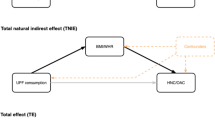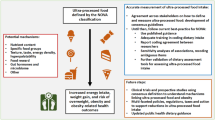Abstract
Background
The relationship between dietary and lifestyle risk factors and long-term mortality from colorectal cancer is poorly understood. Several factors, such as obesity, intakes of red meat, and use of aspirin, have been reported to be associated with risk of colorectal cancer mortality, though these findings have not been replicated in all studies to date.
Methods
In the Minnesota Colon Cancer Control Study, 46,551 participants 50–80 years old were randomly assigned to usual care (control) or annual or biennial screening by fecal occult blood testing. Colon cancer mortality was assessed after 30 years of follow-up. Dietary intake and lifestyle risk factors were assessed by questionnaire at baseline.
Results
Age [hazard ratio (HR) 1.09; 95% CI 1.07, −1.11], male sex (HR 1.25; 95% CI 1.01, 1.57), and higher body mass index (BMI) (HR 1.03; 95% CI 1.00–1.05) increased the risk of CRC mortality, while undergoing screening for CRC was associated with a reduced risk of colorectal cancer mortality (HR 0.76; 95% CI 0.61–0.94 and 0.67; 95% CI 0.53–0.83 for biennial and annual screening, respectively). Intakes of grains, meats, proteins, coffee, alcohol, aspirin, fiber, fruits, and vegetables were not associated with colorectal cancer mortality.
Conclusions
Our study confirms the relationship between BMI and long-term colorectal cancer mortality. Modulation of BMI may reduce risk of CRC mortality.


Similar content being viewed by others
References
Siegel R, Naishadham D, Jemal A. Cancer statistics, 2012. CA Cancer J Clin. 2012;62:10–29.
Tarraga Lopez PJ, Albero JS, Rodriguez-Montes JA. Primary and secondary prevention of colorectal cancer. Clin Med Insights Gastroenterol. 2014;7:33–46.
Parkin E, O’Reilly DA, Sherlock DJ, Manoharan P, Renehan AG. Excess adiposity and survival in patients with colorectal cancer: a systematic review. Obes Rev. 2014;15:434–451.
McCullough ML, Gapstur SM, Shah R, Jacobs EJ, Campbell PT. Association between red and processed meat intake and mortality among colorectal cancer survivors. J Clin Oncol. 2013;31:2773–2782.
Freedman ND, Park Y, Abnet CC, Hollenbeck AR, Sinha R. Association of coffee drinking with total and cause-specific mortality. N Engl J Med. 2012;366:1891–1904.
Lopez-Garcia E, van Dam RM, Li TY, Rodriguez-Artalejo F, Hu FB. The relationship of coffee consumption with mortality. Ann Intern Med. 2008;148:904–914.
Sugiyama K, Kuriyama S, Akhter M, et al. Coffee consumption and mortality due to all causes, cardiovascular disease, and cancer in Japanese women. J Nutr. 2010;140:1007–1013.
Tamakoshi A, Lin Y, Kawado M, Yagyu K, Kikuchi S, Iso H. Effect of coffee consumption on all-cause and total cancer mortality: findings from the JACC study. Eur J Epidemiol. 2011;26:285–293.
Cai S, Li Y, Ding Y, Chen K, Jin M. Alcohol drinking and the risk of colorectal cancer death: a meta-analysis. Eur J Cancer Prev. 2014;23:532–539.
Breslow RA, Chen CM, Graubard BI, Mukamal KJ. Prospective study of alcohol consumption quantity and frequency and cancer-specific mortality in the US population. Am J Epidemiol. 2011;174:1044–1053.
Gilbertsen V. Colon cancer screening: the Minnesota experience. Gastrointest Endosc. 1980;26:31S–32S.
Mandel JS, Bond JH, Church TR, et al. Reducing mortality from colorectal cancer by screening for fecal occult blood. Minnesota Colon Cancer Control Study. N Engl J Med. 1993;328:1365–1371.
Shaukat A, Mongin SJ, Geisser MS, et al. Long-term mortality after screening for colorectal cancer. N Engl J Med. 2013;369:1106–1114.
Kaplan EL, Meier P. Non parametric estimation from incomplete observations. J Am Stat Assoc. 1958;53:457–481.
Little RJA, Rubin DB. Statistical Analysis with Missing Data. 2nd ed. London: Wiley; 2002.
Buuren SV, Groothuis-Oudshoorn K. mice: multivariate imputation by chained equations in R. J Stat Softw. 2011;45:1.
Horvitz D, Thompson D. A generalization of sampling without replacement from a finite universe. J Am Stat Assoc. 1952;47:663–685.
Efron B, Tibshirani R. Cross validation and the bootstrap: estimating the error rate of a prediction rule. Technical report 176, Department of Statistics, Stanford University; 1995.
Esposito K, Chiodini P, Capuano A, et al. Colorectal cancer association with metabolic syndrome and its components: a systematic review with meta-analysis. Endocrine. 2013;44:634–647.
Bardou M, Barkun AN, Martel M. Obesity and colorectal cancer. Gut. 2013;62:933–947.
Ho GY, Wang T, Gunter MJ, et al. Adipokines linking obesity with colorectal cancer risk in postmenopausal women. Cancer Res. 2012;72:3029–3037.
Xu XT, Xu Q, Tong JL, et al. Meta-analysis: circulating adiponectin levels and risk of colorectal cancer and adenoma. J Dig Dis. 2011;12:234–244.
Winzer BM, Whiteman DC, Reeves MM, Paratz JD. Physical activity and cancer prevention: a systematic review of clinical trials. Cancer Causes Control. 2011;22:811–826.
Renehan AG, Tyson M, Egger M, Heller RF, Zwahlen M. Body-mass index and incidence of cancer: a systematic review and meta-analysis of prospective observational studies. Lancet. 2008;371:569–578.
Rothwell PM, Fowkes FG, Belch JF, Ogawa H, Warlow CP, Meade TW. Effect of daily aspirin on long-term risk of death due to cancer: analysis of individual patient data from randomised trials. Lancet. 2011;377:31–41.
Li P, Wu H, Zhang H, et al. Aspirin use after diagnosis but not prediagnosis improves established colorectal cancer survival: a meta-analysis. Gut. 2014;64:1419.
Cardwell CR, Kunzmann AT, Cantwell MM, et al. Low-dose aspirin use after diagnosis of colorectal cancer does not increase survival: a case-control analysis of a population-based cohort. Gastroenterology. 2014;146:700-8e2.
Domingo E, Church DN, Sieber O, et al. Evaluation of PIK3CA mutation as a predictor of benefit from nonsteroidal anti-inflammatory drug therapy in colorectal cancer. J Clin Oncol. 2013;31:4297–4305.
Nishihara R, Lochhead P, Kuchiba A, et al. Aspirin use and risk of colorectal cancer according to BRAF mutation status. JAMA. 2013;309:2563–2571.
Hsing AW, McLaughlin JK, Schuman LM, et al. Diet, tobacco use, and fatal prostate cancer: results from the Lutheran Brotherhood Cohort Study. Cancer Res. 1990;50:6836–6840.
German RR, Fink AK, Heron M, et al. The accuracy of cancer mortality statistics based on death certificates in the United States. Cancer Epidemiol. 2011;35:126–131.
Zauber AG, Winawer SJ, O’Brien MJ, et al. Colonoscopic polypectomy and long-term prevention of colorectal-cancer deaths. N Engl J Med. 2012;366:687–696.
Ederer F, Geisser MS, Mongin SJ, Church TR, Mandel JS. Colorectal cancer deaths as determined by expert committee and from death certificate: a comparison. The Minnesota Study. J Clin Epidemiol. 1999;52:447–452.
Acknowledgments
We are indebted to Erik Bjelke for the foresight to add this questionnaire to the study and for initiating the work associated with administering it. We also thank the following research staff: Deborah Engelhard, Jill Cordes, Mindy Geisser, and Gavin Watt; and the residents of Minnesota and Wisconsin that participated in this study.
Funding
This study was funded by Veterans Affairs Merit Program EPID-007-09S and research contracts from National Institutes of Health/National Cancer Institute and Grants N01CB95613, N01CB61005, N01CB53862, and R01CA65728.
Author information
Authors and Affiliations
Corresponding author
Ethics declarations
Conflict of interest
None.
Rights and permissions
About this article
Cite this article
Shaukat, A., Dostal, A., Menk, J. et al. BMI Is a Risk Factor for Colorectal Cancer Mortality. Dig Dis Sci 62, 2511–2517 (2017). https://doi.org/10.1007/s10620-017-4682-z
Received:
Accepted:
Published:
Issue Date:
DOI: https://doi.org/10.1007/s10620-017-4682-z




